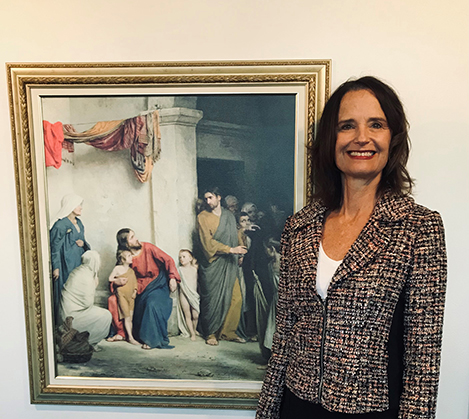Enjoying Diverse Journeys Through a Social Work Career
 Often, people use employment opportunities to specialize—to carve out a niche for
the thing in which they become an expert. It’s a pathway that’s encouraged in academia,
and, in many respects, is the main driver of graduate programs: specialize to advance.
Though common in many ways, this is the opposite of College of Social Work MSW alumna
Malynda Eastman’s philosophy.
Often, people use employment opportunities to specialize—to carve out a niche for
the thing in which they become an expert. It’s a pathway that’s encouraged in academia,
and, in many respects, is the main driver of graduate programs: specialize to advance.
Though common in many ways, this is the opposite of College of Social Work MSW alumna
Malynda Eastman’s philosophy.
In her decades-long career, she has moved through half a dozen different fields, from the ER to primary schools to quality assurance administration in the Orange County department of children’s mental health. All these opportunities have utilized the same core social work skills of supporting and helping people, but each has offered new challenges and opportunities for growth.
“I welcome the diversity that comes with different settings,” said Ms. Eastman. “I like the change. Part of why I went into social work was because I knew it would open so many doors.”
“I’ve always been a little bit different,” she mused. “When I went to school in the 1970s, most of my peers wanted to get married and have a family. I didn’t.” Instead, she wanted to go to graduate school and have a career. After returning from a mission in Japan for the Church of Jesus Christ of Latter-day Saints, she worked at the University of Utah medical center, and with a written recommendation from a colleague, she applied, and was accepted into the social work program. It was kismet. “I loved the University of Utah from the very beginning. The diversity and progressive ideas I found here were such a natural fit. I loved it.”
That enthusiasm has stretched through every phase of her career. “I’ve enjoyed it all,” she reflected. “I enjoyed playing with kids and helping them work through and process really difficult situations. I enjoyed working on multidisciplinary medical teams to solve complex care issues. I enjoyed supporting hospital patients in making end of life decisions. I enjoyed being a detective in analyzing DCFS case files. It’s all been fulfilling in different ways.”
For Ms. Eastman, the thread that unites all her work is a principle grounded in her faith: “I follow the teaching of Christ to love people. The first, most important thing, is to love people.”
She expanded, “I’ve always considered that part of being a social worker is getting out of yourself. Even if I don’t agree with another person, as a social worker, I need to be able to learn about their perspective and connect with them.” This mindset has helped guide her through multiple stages of her life. “Growing up, my mom told me: if you feel lonely, find someone who feels lonelier than you. I still do this when I need to. I cherish opportunities to connect with people.”
Now retired, Ms. Eastman is serving another mission for her church. Her work includes reviewing application materials for young people preparing to serve their own missions for their church and determining, along with a team of other mental health professionals, their readiness for different kinds of service. With this work, she has been part of a growing movement to open up different kinds of service opportunities for young people in the Church. “There’s a lot more flexibility in callings now, with many more service mission opportunities for young people for whom full time missionary service would have been a challenge,” she said. Seeing this change has been fulfilling for Ms. Eastman. “Helping people find the right way for them to succeed is so important in social work. I really value being a part of that shift in this setting.”
